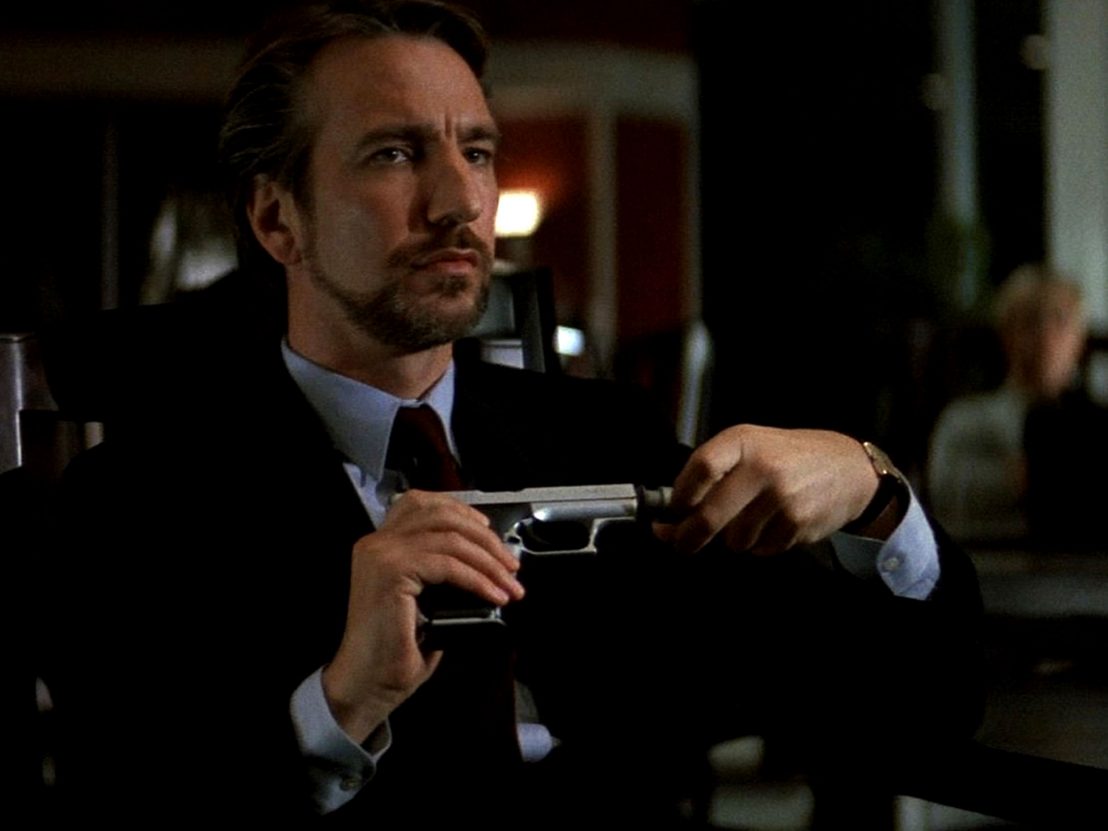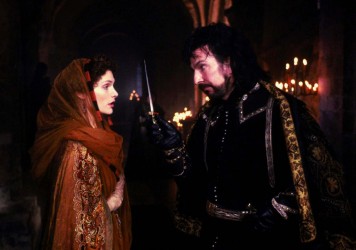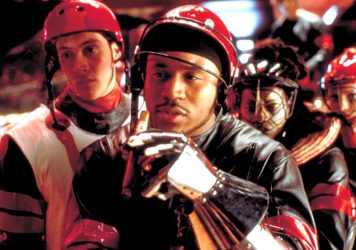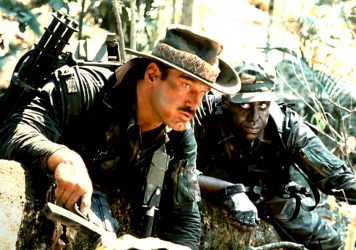
The ‘War on Terror’ has always been defined through abstracts, as a conflict between one way of life and another, rather than anything physical. This creates a helpful definition of terrorism; a kind of fanatical, bloodthirsty devotion to a specific way of life, and a desire to force that way of life onto other people.
This definition of terrorism, and the War on Terror, is a useful prism through which to approach the ideology of John McTiernan’s Die Hard. When Hans Gruber and his comrades begin laying siege to the Nakatomi Plaza, the assumption is that they’re an extremist sect; Gruber is even revealed to have ties with a fanatical group based out of West Germany. But in the end it isn’t about terrorism, at least not by most people’s definition of the term. When Gruber and his men take Nakatomi President Mr Takagi hostage, they do so in an attempt to gain access to the company’s vault, prompting Takagi to ask, “what kind of terrorists are you?” Gruber’s response is telling: “Who said we were terrorists?”
The film’s climax also takes Gruber’s ideology – or lack of it – to task, as he’s levelled with the accusation of being nothing but a “common thief.” But this theft, this devotion to money, is precisely what makes him a terrorist; that distinction is just more difficult to make when his fanaticism is for a distinctly American ideology.
The way Gruber treats the hostages, and even the police and FBI, gives the impression of someone moving assets around; it’s no wonder that Ellis, a classic yuppie with an expensive wristwatch, obnoxious demeanour, and cocaine habit, is the one who tries in vain to get through to his captor. Ellis reframes the attack on the Nakatomi Corporation in “his language,” using the terminology of hostile takeovers and poisoned pills, something that serves to only reinforce the fact that Hans and Ellis are not so different; they see the world the same way, they’re just trying to conquer it through different means.
That poisoned pill, John McClane, is Gruber’s direct opposite not just in terms of how each character is presented – although a torn and bloodstained vest is certainly a stark contrast to a smart suit – but also in how they view the world and the people around them. McClane doesn’t value anyone as disposable, and whenever he fails to save someone, whether it’s Takagi or Ellis, he’s racked with guilt; he sees them as people rather than assets.
Gruber’s suits are another striking thing about him; in his opening conversations with Takagi, he talks about industrialisation and men’s fashion, about the perfection of the model for the Nakatomi Corporation’s project in Indonesia. His similarities with Takagi hammer home the similarities in their worldviews. Gruber even owns the same suit Takagi is wearing (“John Phillips, London. Rumour has it Arafat buys his there too.”) The fact that Gruber is not a dyed-in-the-wool revolutionary, admitting to only being aware of the Asian Dawn movement after reading about them in TIME Magazine, doesn’t stop him from being a fanatic or an extremist. An ideology that differs from the dominant one isn’t the only way to define a terrorist – Gruber is proof of that.
While his first speech makes reference to the Nakatomi Corporation’s “legacy of greed around the globe,” he is clearly functioning in the same way. The similarities between Gruber and Takagi are not merely cosmetic, as both are essentially in favour of expansion in the name of industry and profit. Where they differ most obviously is execution – while Takagi and the Nakatomi Corporation expand through the global market economy, Gruber does so through fear and violence.
After all, like any true capitalist, Gruber wants to profit from his venture. His endgame after taking the money isn’t to bankroll a revolution but to sit on a beach, “earning 20 per cent”. This rich-get-richer mentality, which in Gruber’s case comes from the literal blood and death of workers, serves as a reminder of the dangers inherent in capitalism, and the inequality it engenders.
The thrust of Gruber’s capitalist extremism is the extent to which it causes him to dehumanise those around him. Even the people he works with are seen as expendable, and his ruthlessness extends to firing rockets at a vehicle that would never be able to reach him. The reason McClane is such an effective and compelling hero is that he represents the antithesis of Gruber’s ideology.
His self-description as a “New York cop” coupled with his uncertainty at riding in limos and attending fancy office parties puts him at odds with Gruber. They see the world in fundamentally different ways; just as Gruber has similarities with Nakatomi, his differences with everyman McClane boil down to the ideologies and very souls of the two men. McClane’s brave rebellion against Gruber’s blood money scheme marks him as a strange combination of chest-pumping libertarian action hero and one-man revolutionary army.
Published 14 Dec 2019

The late British actor was a star of both stage and screen, but what was it that made him such a compelling movie villain?

By Nadine Smith
John McTiernan’s maligned 2002 remake is one of the sharper anti-capitalist films of modern times.

The larger-than-life catchphrase machine epitomised the hyper-masculinity of ’80s action cinema.